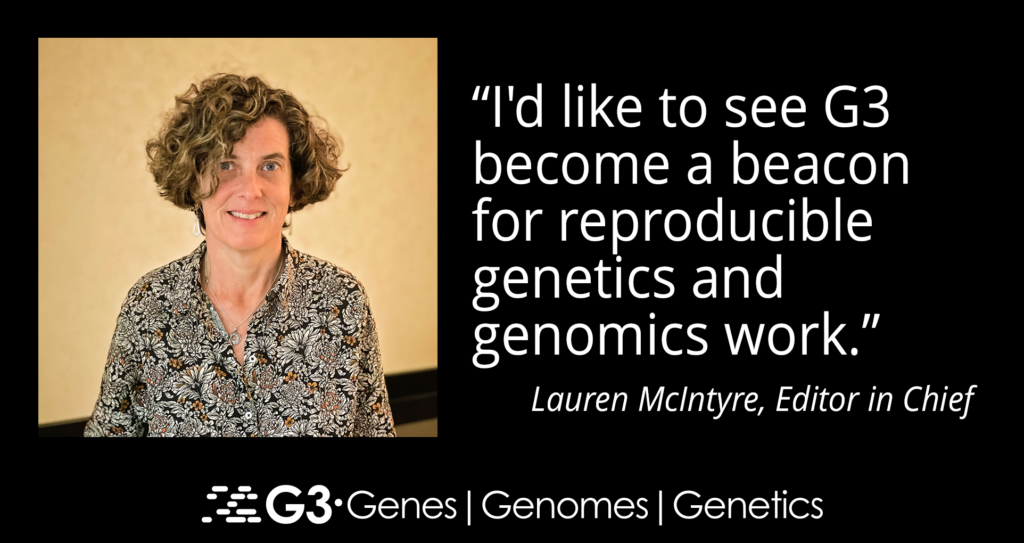From its inception, G3 has sought to serve a wide and varied community of scientists who use genetics and genomics. Now, as Lauren McInytre steps into the role of Editor in Chief— the second in G3’s history—her focus is set on meeting community needs.
McIntyre’s career has exemplified interdisciplinarity. Starting college with an initial interest in physics and math, she explored biology and genetics as electives. Her introduction to Hardy-Weinberg equilibrium, which describes the relationship between allele frequencies and genotypic frequencies in an equilibrium population, captured her attention and imagination as a student—and it continues to fascinate her today.
“In an intro to genetics class my junior year, I went to office hours to talk about Hardy-Weinberg equilibrium. I wanted to know what happened when the assumptions didn’t hold. My professor told me it wasn’t going to be on the test, and I told him I didn’t care. I wanted to know,” says McIntyre.
She was then introduced to biomathematics: a discipline she hadn’t known existed but that fit her interests well. After earning her biomathematics degree at Rutgers, she went on to do her graduate work at North Carolina State University, a “powerhouse of population and quantitative genetics” at the time.
McIntyre struggled to make up her mind between statistics and genetics, noting that “back in the day, interdisciplinarity wasn’t as popular as is today.” She loved genetics and enjoyed the puzzles and logic of math. She began working with Bruce Weir, whose research and expertise spanned both subjects, and she took genetics classes and statistics classes, writing her dissertation on Hardy-Weinberg equilibrium.
McIntyre describes her scientific interests as “basic”—basic as in fundamental, not as in simple. “How does transcription work? How is it regulated? How are genes connected to one another in networks? How do we get from genotype to phenotype?” These questions have taken her into a number of different experimental systems. From Staphylococcus to Drosophila, Arabidopsis to Zea mays, dandelions to humans—and with a recent interest in C. elegans—McIntyre is well-acquainted with the power of both classic model organisms and emerging systems to tease apart the “genotype to phenotype problem.”
Her cross-discipline expertise and broad experience with experimental systems make McIntyre a natural fit for G3, complementing the journal’s mission of publishing high-quality, foundational research across subfields of genetics and genomics and across organisms.
While her role as Editor in Chief at G3 is a new endeavor, McIntyre is no stranger to society journals and editing work.
“I’ve had a long-standing commitment to GSA and to scientific societies in general. I’ve been a member of a scientific society since my grad school days,” she says. “I’ve always thought that the way that papers are reviewed at society journals is good science getting better.”
In fact, McIntyre published her thesis paper, titled “Hardy-Weinberg Testing for Continuous Data,” in GENETICS.
Her first editing role was with Molecular Biology and Evolution. McIntyre also spent 15 years editing at GENETICS with then-Editor in Chief Mark Johnston: first as an Associate Editor, then as a Senior Editor, and finally as a Series Editor.
“I liked Mark’s team approach to editing and his enthusiasm for the individual scientist, and I caught the bug! I really enjoy publishing good science; I feel like it’s exciting to see good papers come out and to know that you’ve been a part of helping people make their work more accessible.”
She was at GENETICS as G3 was being envisioned and has been an enthusiastic supporter of the journal since before its launch.
“I think the idea, from the beginning, was not to superimpose editorial perceptions of what was “interesting” or “important” onto other people. What Brenda Andrews did with G3 is amazing; she made it a place for excellent science. It excites me that G3 focuses on robust, reproducible science from the single gene to the genome.”
She continues, “Genetics is such a broad discipline. If somebody has spent years collecting data and has an excellent experiment to understand a question, that makes it important.”
Indeed, one of G3’s founding principles was this:
Because your research is important to you, it’s important to us.
G3 has had a strong start over its first decade in publication, but it remains a young journal—and one full of potential, especially in the age of big data.
“Part of what I want to focus on for G3, moving forward, is how to improve the discoverability of people’s work. I want to come up with new ways of thinking about data and metadata,” says McIntyre.
These days, scientists are generating more data than ever before, and that data best serves the field when it’s available for use and reuse—and is easily findable. McIntyre wants to explore ways to increase discoverability and further data reuse. She wants to understand what formats and standards encourage data reuse and to hear from the community about what they want to see in terms of data availability from studies. She is also interested in seeing more papers from organisms across the tree of life.
“I want to be more inclusive on lots of axes—what organisms we’re publishing, what science we’re talking about, who our authors and reviewers are. Topic-wise, I want to see everything from nitty-gritty molecular and developmental work to hardcore mathematics. I’d like to see G3 become a beacon for reproducible genetics and genomics work.”
McIntyre’s vision for G3 is focused on accessibility, inclusivity, reproducibility, and in all things, serving the community.
“The job of the journal is to be responsive to what the community needs. This journal doesn’t belong to me; it belongs to the entire community of people doing genetics and genomics. As Editor in Chief, it’s my job to ask, “What do they need? What do they need to make their work more accessible—to explain the experiments they’ve done—to show that the science they’ve done is interesting and important within the broader field?””
If you’d like to share your answers to those questions, you can reach McIntyre at g3_eic@thegsajournals.org.































